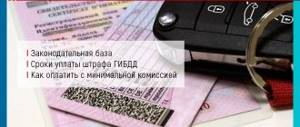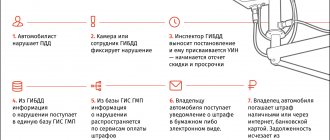Unknowingly or on purpose, almost all drivers violate traffic rules at least once in their lives. Some of them are sincerely surprised at this, not understanding what exactly they violated and why the fine was imposed. But this does not relieve responsibility. Not all motorists are well acquainted with the intricacies of administrative legislation. And even more so, few of them are aware that there is such a rule as the statute of limitations for traffic police fines. Essentially, this is the period after which you will no longer be held accountable. In this publication, we will look in detail at how long fines are stored in the traffic police database, whether it is possible not to pay, and what this entails.
Time frame for paying fines in 2018-2019
According to the norms of Russian legislation, namely, the Code of Administrative Violations, car owners who are subject to certain penalties for violations are required to pay a fine no later than eighty days after receiving it. This period of time is essentially divided into three stages:
- The first ten days, during which the offender can appeal the protocol in court in the event that he partially or completely disagrees with the punishment;
- 60 days from the moment the decision came into force;
- Ten days after the case was transferred from the court to the enforcement authorities.
Please note: for any violations, the countdown begins from the moment a copy of the protocol and a payment receipt were received. This rule is the same for all motorists: those who were issued a fine on the spot, and those who received a corresponding notification by mail as a result of video recording of the violation.
Accordingly, we can summarize: for almost three months there is no rush to pay the fine. But if you wait and exceed the deadline established by law, you will certainly face various sanctions. Among these:
- Double the fine (but not less than 1000 rubles);
- Arrest for fifteen days;
- Executive work for a period of 50 hours;
- Problems with border crossing;
- Refusal to leave the Russian Federation for other countries (this rule applies to fines exceeding 10,000 rubles and only if there is a corresponding court decision)
That is why, before refusing to pay a fine, think about whether it is worth it and what consequences are possible in your case.
Collection of administrative fines
According to the rules, a citizen is obliged to pay off an administrative fine no later than 60 days from the date of entry into force of the decision on its imposition. If a person has asked for a deferment, the debt must be repaid 2 days before its completion. If the transfer of funds has not been made, additional punishment will be applied to the citizen by bailiffs.
According to Art. No. 20.25 of the Code of Administrative Offenses of the Russian Federation, if this happened, the amount of the penalty will increase by 2 times or the citizen will be subject to administrative arrest for up to 15 days. In a number of situations, the punishment can be modified by engaging in compulsory labor for up to 50 hours.
If a violation of the established deadlines is detected, the bailiff will begin drawing up a protocol on the administrative offense. Then there is accountability. The court has 3 months to call the citizen to account.
Responsibility periods may vary. So, if the last day of voluntary debt repayment falls on a holiday or weekend, the period is transferred to the first working day following it. For this reason, experts advise independently calculating the time period during which a person has the right to make settlements with the state without imposing additional sanctions.
Representatives of the FSSP actively interact with other government bodies and services. This allows bailiffs to have an effective impact on persons who evade paying fines. Therefore, experts advise not to hide, but to make contact with government officials and try to resolve the current situation.
Limitation period for traffic police fines
In fact, every driver is obliged to repay the receipts issued to him on time and in full. Road patrol services must closely monitor compliance with this norm. But this doesn't always happen. Especially when it comes to minor fines. That is why the situation is quite real when such holders of fines are forgotten. In practice, this is like this: 80 days have passed, and the offender has not received any notice by mail. What to do in this case? Hurry to the cashier and quickly pay the fine? In fact, you shouldn't do this. After all, this is exactly the case when you can wait. And it is likely that in this case the statute of limitations will come to an end. A tempting prospect, isn't it?
How long are fines stored in the traffic police database?
The Code of Administrative Offenses of the Russian Federation clearly defines the norms when a fine can be completely forgotten. Given the fact that no relevant changes were made in 2021, the statute of limitations for similar cases is two years from the date of entry into force. However, we should not forget that the traffic police fine does not come into force immediately, but only ten days after receiving it. This period may be longer in cases where judicial appeals take place. Therefore, two years should be counted not from the moment when the receipt was received, but from the period when the decisions came into force. Essentially, it's two years plus ten days.
When will the bailiffs take over your case?
Bailiffs, as a rule, allow a minimum period of time for voluntary repayment of a fine - only five days. It is also worth mentioning that only those drivers who were not looked for at all or looked for poorly, and not those who hid well from the bailiffs, manage to avoid paying fines (by waiting for the statute of limitations to expire).
When chance can help
Sometimes all sorts of delays that are inherent in the work of various government agencies can prevent you from paying fines. In other words, if you received a citation in the mail for a traffic violation that occurred more than two months ago, no one can force you to pay for it. Another option is possible: the violation order, which was recorded by a photo/video camera, was sent, but continues to gather dust in the mail, and the recipient is in no hurry to pick it up. In this case, this letter will be sent again to the sender. And it is from this moment that the corresponding resolution will come into force. In a situation where the fine exceeds the amount of 10,000 rubles, and the violator ignores payment, then a temporary restriction on traveling outside the Russian Federation may well be applied to him.
Important points
There is often a situation where the video camera is not fixed correctly. As a rule, we are talking about situations where the equipment mistakenly photographed the actions of a motorist who did not violate the rules. In these cases, it is definitely worth challenging the decisions of the traffic police in court. In addition, the fact of a violation can be documented only no later than three months. In the case where they require the driver to pay a penalty after ninety days, this is illegal.
When can bailiffs collect a traffic fine?
Collection of traffic police fines by bailiffs forcibly begins if a person ignores the need to pay them within 2 months from the date of receipt of the order. According to the rules, it comes into force after 10 days have passed from the moment it was provided to the violator. This period is allocated so that a citizen can go to court and appeal the traffic police decision.
A citizen has the right to a deferment. It is provided if a person knows that he will not have time to pay the fine within the period established by law. In order for the state to cooperate, it is necessary to draw up a statement. Installments are available for 1 or 3 months.
If the driver has not started the procedure for appealing the traffic police fine or has not asked for an additional period to repay the debt, the case is transferred to the Federal Bailiff Service. They will begin collecting fines by force.
Is there a statute of limitations for traffic fines?
Taking into account the above, unpaid fines will be automatically canceled after two years and ten days have passed from the moment you received the relevant notices and payment documents. It is possible that you will not have the opportunity to refuse to pay the fine at that time. The reason for this is the peculiarities of the well-known bureaucratic machine.
There will be no grounds for paying a fine in cases where:
- The fine was issued more than 60 days after the violation;
- The decision was made in judicial appeals of the penalty later than 90 days, which had passed from the moment the offense was committed.
Nuances
If the fine has been paid, but it continues to remain in the system as unpaid, it is recommended that you print out the receipt and contact the territorial inspection department with it. This can be done during a personal visit or online.
If the traffic police fine has been paid, but a letter has been received from the bailiffs, you must contact them. There is no point in delaying this, since bailiffs have the authority to double the amount of the fine for late payment. To resolve the issue, you can apply either in person or using an online application. When applying in person, you will need to provide an authorized employee with a copy of the receipt for payment of the fine.
You can appeal the accrual of penalties in the manner prescribed by the provisions of the Code of the Russian Federation on Administrative Offenses.
| Question | Answer |
| When does information about a fine appear in the traffic police database? | Within 3 days after the decision is made |
| When is the decision made? | Within 15 working days (Article 29.6 of the Code of Administrative Offenses of the Russian Federation) |
| When paying within what time frame is the discount provided? | Within 20 days (Article 32.2 of the Code of Administrative Offenses of the Russian Federation) |
| Where can I check the accrual of the fine? | On the official website of the State Traffic Safety Inspectorate, on the State Services service, in personal online banking accounts, etc. |
Comments Showing 0 of 0
conclusions
Almost all decisions have their own statute of limitations. A fine from the traffic police is no exception. However, consider whether you should wait a little over two years for the penalty obligation to disappear. Especially if you have to constantly risk meeting with bailiffs or worry about being denied permission to travel abroad. And this takes into account the fact that many fines are cheap. Of course, this is a rather controversial issue. At the same time, each car enthusiast decides it exclusively for himself personally.
But most importantly, the best way to avoid paying fines is to drive strictly according to the traffic rules. This is the only way to save nerves, time and, most importantly, your financial resources, spending them on more pleasant and useful things.








